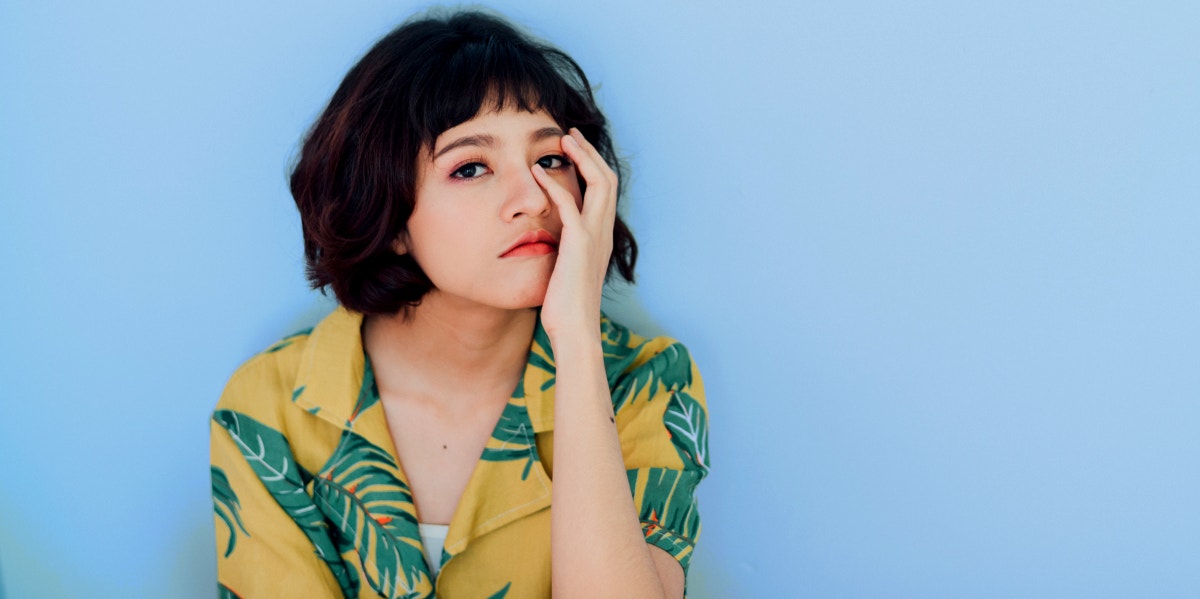What Is Trichotillomania? + 9 Signs Of This Hair-Pulling Disorder
It's an impulsive disorder.
 wolfstudiobkk/shutterstock
wolfstudiobkk/shutterstock Trichotillomania, an impulsive control disorder, is most commonly referred to as “hair-pulling disorder.”
For many, this is a psychological issue that goes undiagnosed. Often passed off as a bad habit, trichotillomania can cause severe physical and psychological damage if untreated.
Whether you or someone you know is struggling with this disorder, it's important that you understand how this condition manifests, what it means, and what treatment options are available.
What is Trichotillomania?
People dealing with trichotillomania have an uncontrollable, often unexplained urge to pull out their own hair from their scalp, eyebrows, eyelashes, or any other bodily hair.
This is often a response to stress or anxiety, and acts as a means of self-soothing. But by acting on this impulse, many inflict damage upon themselves that only heightens their worries.
These impulses are acted upon both consciously and unconsciously. In some cases, trichotillomania occurs in sleep, and those who suffer from it have no recollection of pulling out their hair when they wake up.
Some people with trichotillomania may go as far as to eat the hair they pull out.
This is known as trichophagia. Trichophagia, sometimes referred to as Rapunzel Syndrome, can cause significant problems in the gastrointestinal tract because humans are unable to digest hair. This often requires surgical intervention.
Researchers estimate that trichotillomania affects between 0.5 percent to 2 percent of the population, often beginning in adolescence, but occasionally occurring in childhood or adulthood.
In adolescence, trichotillomania is equally prevalent among men and women, but more adult women report having the condition than men of the same age. This is possibly due to the hormonal changes women experience as they get older.
A 2018 study concluded that the hormonal changes women experience at the start of their menstrual cycle may cause women to have more urges to pull out their hair. Equally, a 2013 case study noted that symptoms of trichotillomania may get worse during pregnancy due to hormonal changes.
In both studies, researchers were unable to determine why this happens, making trichotillomania quite an allusive condition that is difficult to explain.
Trichotillomania Symptoms
What might appear like an uncontrollable habit could actually be trichotillomania and, once diagnosed, can be addressed and treated.
Symptoms often appear in cycles, so be aware that just because signs may disappear for a few months, it doesn’t mean hair-pulling urges won’t reoccur. Those who are dealing with trichotillomania may exhibit some of the following symptoms.
1. Feeling relief, satisfaction or pleasure from acting on the impulse to pull hair
2. Waking with missing hair or excessive amounts of hair on pillows
3. Feeling tense or anxious while trying to resist the urge to pull hair
4. Bare patches where hair has been pulled out
5. Excessive twisting, playing with, or chewing hair
6. Distress, social anxiety, or problems in work, school, or social life due to hair-pulling
7. Skin irritation on scalp or hair site due to forced hair removal
8. Breaking off pieces of hair from the ends
9. Hair thinning
Trichotillomania Causes and Risk Factors
The exact cause of trichotillomania has not yet been determined, but many scientists, psychiatrists, and psychologists have researched the genetic and environmental factors that contribute to the condition.
1. Family history
Those with a close genetic link to another person who suffers from trichotillomania are more likely to experience the condition themselves. Since trichotillomania may be related to brain pathways that link areas involved in managing emotions and responses, it's possibly hereditary.
2. Other mental health disorders
This study links hair-pulling disorder to anxiety and examined a group of people suffering from anxiety, who experienced increased urges to pull their hair during periods of anxiety.
The same study also states that trichotillomania and depression often co-occur. OCD is another condition often linked to trichotillomania, though their effects and treatment are very different.
Some research suggests that trichotillomania is a potential reaction to being raised in a household where OCD is present.
3. Age
Children can be prone to hair-pulling in infancy. This is not to be confused with trichotillomania developed in adolescence.
Often, children who develop hair-pulling tendencies before the age of 6 grow out of it within a few years. Compulsive hair-pulling developed later on may require more attention.
4. Stress
Almost all research into trichotillomania connects the disorder to stress, as people use hair-pulling as a method of soothing. The stress could be related to anything from work to social life to domestic issues.
People conflate the feeling of hair-pulling with temporary stress relief and repeat this habit as more stressful situations arise.
Trichotillomania Treatment
Doctors diagnose trichotillomania by examining medical histories and reviewing symptoms. Often, this means ruling out any other possible causes of hair loss by sending patients to a dermatologist.
Since trichotillomania is an impulsive disorder, a doctor will ensure that the patient has demonstrated repeated failed attempts to get control over this habit before making any diagnosis.
Trichotillomania can be treated through behavioral therapy.
This 2012 study showed the benefits of habit reversal therapy on people struggling with trichotillomania.
Some prescribed medications — including N-acetylcysteine, olanzapine, and clomipramine — have been linked to correcting hair-pulling habits. If you or someone you know is concerned about this disorder, it may help to speak to a mental health specialist or doctor.
Alice Kelly is a writer and storyteller with a passion for lifestyle, entertainment, and trending topics. When she’s not creating content for YourTango, you can catch her working on creative fiction and vintage shopping.

